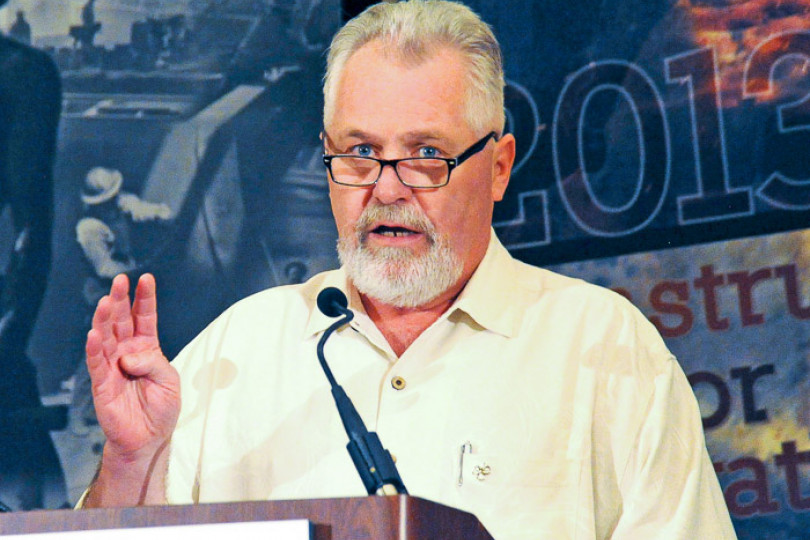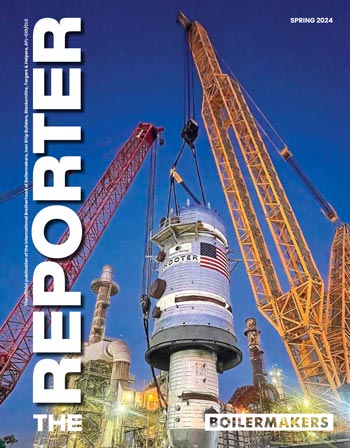While the U.S. Congress struggles to fashion an immigration bill that addresses temporary foreign workers, Canada is engaged in its own national debate over TFWs. Some Canadian leaders claim TFWs take jobs that Canadian citizens need. In a commentary first published in the National Post newspaper, IVP Joe Maloney explains why bringing in skilled boilermakers from other countries is not only necessary but good for Canada.
CANADIANS ARE JUSTIFIABLY outraged that some businesses have been using the Temporary Foreign Workers (TFW) Program as a way to replace their Canadian employees with lower-paid substitutes from overseas.
While such conduct is reprehensible, we must keep in mind that the program does provide significant benefits to the Canadian economy and to all Canadians. We congratulate the federal government for taking steps to regulate this program. But we urge the government not to harm those who play by the rules and who use the program in the way it was intended.
As the union that represents more than 10,000 boilermakers and apprentices across Canada, we use the TFW Program to bridge temporary gaps in the supply of skilled boilermakers to the more than 300 contractors with which we work.
Our members are highly skilled construction and maintenance specialists who work primarily at heavy-industrial installations, an area of the economy that is booming in many regions of Canada. They must complete a government-supervised, four-year apprenticeship program before they can obtain their license to work as boilermakers.
Canadian, U.S. Boilermakers work well together
IF THE RECENT Syncrude maintenance project in the Alberta tar sands region is any indication, joint crews of Canadian and U.S. Boilermakers are finding that a common language, safety focus, and skill set minimize any adjustments necessary to work well together.
The Syncrude job, one of the largest outages at Ft. McMurray in 2012, drew Boilermakers from 15 local lodges on both sides of the border.
“In all my years as a Boilermaker and being in the construction trades for over 20-something years, [I never saw] professional tradesmen come together and work as a team” in the way they did on the Syncrude outage, noted Denis Lafleur, a Local 146 (Edmonton, Alberta) member, in a written submission to the Boilermaker Reporter.
Assistant National Program Coordinator for Canada Jim Beauchamp stated, “Contractors are very happy with the quality of work, safety, and attitudes of the joint crews.”
Beauchamp said about 130 U.S. Boilermakers are working in Canada at present, and there is a demand for more.
He added that the process of gaining work in Canada has been simplified, thanks to a decision by the Alberta Apprenticeship and Training Board to recognize the Boilermaker National Apprenticeship Program certificate of accomplishment to perform work as welders in the province.
Without our skills, major construction and maintenance projects risk delays, with potentially huge negative economic spinoffs in strategic industries like energy and natural resources.
We are aggressively working to augment the number of Canadian boilermakers through increased intake of apprentices, internships, Helmets to Hardhats (a program which helps former military personnel to learn our trade) and other initiatives. But it takes time to train a certified boilermaker to work in these heavy-industrial, safety-critical facilities. Until we can enlarge the available pool of qualified Canadian boilermakers, we must rely on temporary foreign workers who have the qualifications to assist.
A recent study on temporary foreign workers by the University of Calgary confirms there are labour-supply shortfalls in specific industries, and ours is one of them.
Having argued the need for the TFW Program, however, our union harbours concerns about the possibility for abuse and exploitation. We use the program the way it is meant to be: as a way for employers to temporarily bridge the gap between supply and demand. We work very closely with our employers to determine supply issues, and always follow a strategy of putting Canadians first.
In the program administered by the Boilermakers Union, temporary workers are paid in accordance with our collective agreements. They get exactly what a Canadian boilermaker is paid. We do not add any fees or commissions for our work in arranging for the availability of these workers. They are not exploited in any way (for example, by making them live in company-supplied housing for which they pay rent, or deducting their travel expenses from their first paycheque). They are fully trained in their home countries and are conversant with Canada’s stringent safety requirements. They augment, rather than replace, our Canadian boilermakers. And at the end of their employment contracts, they return home.
Our participation in the national TFW Program benefits everyone involved: our members, who can work in confidence knowing their fellow workers are qualified on their level; the contractors, who can count on a ready supply of qualified boilermakers; the temporary workers themselves, who are able to augment their family incomes while they are unemployed in their home countries; the federal government, which has assisted industry to keep up with demand; and finally, the economy as a whole, which benefits from increased productivity.
The TFW Program, when used properly, gives industry the breathing room it requires to adapt to an expanding economy and helps ensure continued employment opportunities for our existing and future Canadian members. The fact that unscrupulous employers have found loopholes that allow them to cheat the system should not be cause for our government to downgrade or shut down the entire program.
We look forward to working on a continuing basis with federal and provincial governments and our employers to maintain a transparent and credible TFW Program.







